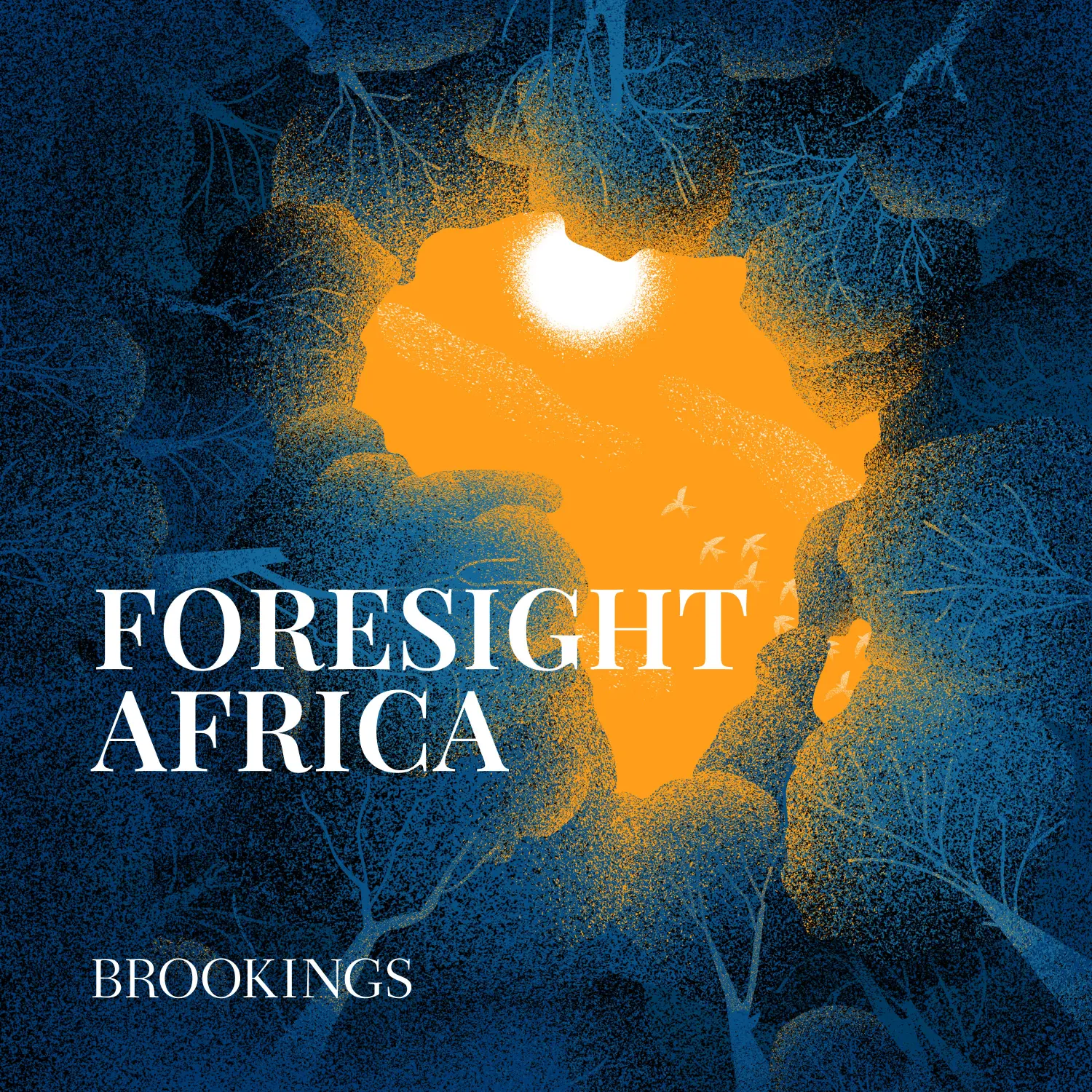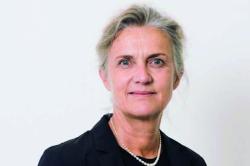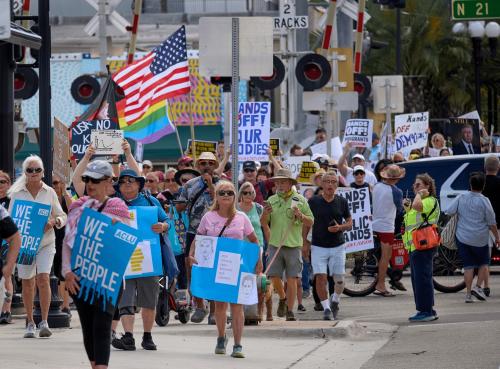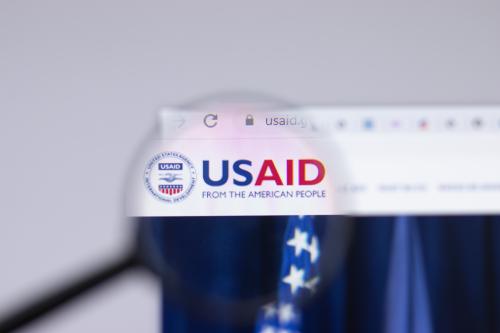Foresight Africa host Landry Signé discusses the findings of the Mo Ibrahim Foundation’s newest governance index with Nathalie Delapalme, the Foundation’s CEO. Countries that have continued to make progress, she says, have done so by putting equal emphasis on all four dimensions of governance: human development, sustainable economic opportunity, security and rule of law, and participation and rights.
- Subscribe to Foresight Africa on Apple, Spotify, Afripods, or wherever you listen to podcasts.
- Listen to previous episodes.
- Watch episodes on YouTube.
- Learn about other Brookings podcasts from the Brookings Podcast Network.
- Sign up for the podcasts newsletter for occasional updates on featured episodes and new shows.
- Send feedback to [email protected].
Transcript
[music]
SIGNÉ: Hello, I am Landry Signe, senior fellow in the Global Economy and Development Program and the Africa Growth Initiative at the Brookings Institution. Welcome to Foresight Africa podcast where I engage with contributors to our annual flagship Foresight Africa report and influential leaders in policy, business, academia, and civil society. My distinguished guests share their unique insights and innovative solutions to Africa’s most complex development challenges while highlighting the continent’s opportunities to advance impactful engagements between Africa, the United States, and the global communities as we approach the deadlines for the Sustainable Development Goals in 2030. You can learn more about this show and our work at Brookings dot edu slash Foresight Africa Podcast.
Today, I welcome Nathalie Delapalme, CEO of the Mo Ibrahim Foundation, co-secretary general of the Africa-Europe Foundation, and a member of the European Council on Foreign Relations, among other roles. The Mo Ibrahim Foundation provides data and analyses to assess global challenges through an African voice, bringing together Africa’s stakeholders, including its youth, to discuss potential solutions grounded in sound leadership and governance.
Thank you so much for joining the podcast today, Nathalie.
DELAPALME: Thank you very much. Thank you for hosting me and giving me that opportunity, Landry. Thank you to all for listening to us. Thank you.
SIGNÉ: I want to start by discussing the 2024 Ibrahim Index of African Governance report that you highlighted in the viewpoint you wrote for this year’s Foresight Africa report. According to your index report, governance performance in 2023 was worse than in 2014 for nearly half of Africa’s population. Given these findings, how serious are the implications for Africa’s governance and what should be done to address them?
[3:03]
DELAPALME: Thank you very much. I mean, it is indeed a matter for concern, but maybe if you first allow me a couple of words of explanation about this index. First, the way we define governance. Governance, it’s not only in our index—democracy, human rights, or absence of corruption—it’s basically also health, infrastructure, access to energy. And it’s the ability of governments to deliver this basket of public goods and services to their citizens. We are clustering this data under four different dimensions: human development, sustainable economic opportunity, security and rule of law, and participation and rights.
The second point is the Mo Ibrahim Foundation is not a primary data provider. We collect data for various sources, actually 49 for this index, who provide us with 300 variables, and we consolidate them on the 96 indicators thanks to a model that we have built initially with the Kennedy School of Governance of Harvard University. We are doing this because we want to apply the same 96 indicators to all 45 countries, and this is very important.
Each index covers the last decade of available data, in this case 2014–2023. So it allows us to see the final performance of ____ in the last year, what is the change in these ten years and the trajectory that has been followed. This is very important, and I hope not to be boring, but it’s important because you can have some countries who still rank very well, but that are trending very badly. For example, you have Mauritius. Or you can have other countries who are still not performing or ranking very high, but are trending very, very well. This is Angola, for example. So this is really important.
Now to come back to your questions. I would say that indeed the picture is a mixed one. You’re absolutely right, and this is a matter for concern. The overall governance level, which in 2023 is lower than it was in 2014 for 21 countries who are currently hosting 48 percent of the continent’s population. So, however, it means that for the 33 remaining countries, progress has been made over that decade. So, it’s not that bad. Once again, it’s a mixed picture.
[6:00]
What happened during that decade is there has been good progress from 2014 to 2018, then almost no change until 2022. This is around during the COVID period and a complete stop, which is a matter for concern between 2022 and 2023. Now, why is that? It’s interesting to see that even if there has been progress, and sometimes consequent progress when it comes to human development and economic opportunities, this has been overtaken by an ongoing and even worsening deterioration when it comes to participation and rights and security and rule of law.
Now two points here. The first one is the deterioration in democracy participation, rights, security is not an African issue. We see it everywhere at global level. So it’s not just, you know, an African challenge, an African crisis. It is concerning for Africa because this situation threatens the progress that have been made in human development and economic opportunity and the progress that remains to be made.
And the second point is that we are talking here about an average and we cannot resume this huge continent to one average. It’s 54 different countries with different geographies, histories, trajectories. So it’s very important to see that point too.
SIGNÉ: Fantastic, Nathalie! I really like how you are providing a systematic overview of the biggest trends in governance on the continent. There are also several countries that have improved since 2013 on various indicators you assess. What have these countries done differently that others can learn from to improve their performance?
[8:11]
DELAPALME: No, you’re absolutely right, and this is very important. I mean, indeed, if you now look at a more at country level, you have, for example, seven countries who are at the same time ranking in the top 10 countries in 2023 and have followed a path of progress over these last 10 years. I mean, you have Seychelles, Morocco, Benin, Tanzania, Cote d’Ivoire, Zambia, and Malawi.
Let me pick out the Seychelles example because it’s a striking one. Seychelles is now number 1 in 2023, having come from being number 7 in 2014. It’s now overcome Mauritius, and it’s not only the best performing country in 2023, but also the best trending over the 10 years. And it has gained 10 points over the 10 years, compared to the average of one point at continental level. And it has performed in all four dimensions. And it’s probably one of the very few countries to do that.
So I would say that here we can probably see two lessons learned. The first one is that even if you’re good, never give up effort, because it needs to be constantly a constant commitment and a constant progress. It’s very easy to lose ground, look at Mauritius. And the second point is balance. You need to achieve progress in all dimensions of governance. There is no trade-off, or at least no sustainable trade-off, between progress on human development, economic opportunity, and progress in safety, security, rule of law, participation. If you let one drop, at some point in the very near future, you drop everywhere.
SIGNÉ: Impressive and insightful, Nathalie! The Foundation just released a report on the divergence between public opinion and government and expert data on governance issues. This report discusses the reason why public perception and lived experiences may not align with traditional data points provided by government agencies and experts and researchers. Can you provide some of the reasons why Africans’ perceptions of African governance may not match expert or government data?
[10:59]
DELAPALME: Thank you very much for this question because it’s indeed one of the key findings of our last index. One small precision, when we talk about official data, it’s not government data. It’s the data from sources like IMF, World Bank, African Development Bank, who do use government data. But we really take care to have data from institutions and not government only, otherwise we couldn’t cover all the countries.
Now, once again, this divergence between official data, expert assessments, and citizens’ opinion is one of the key findings of our last index, and it comes both from the Afrobarometer surveys—we are partnering with Afrobarometer to get surveys from African citizens—but it had also been confirmed with another survey we have run through our Now Generation Network, which is youth opinion specifically. And it says exactly the same.
So these very interesting findings call for probably diverse and complementary explanations. The first explanation is what we call the expectation effect. The more you make progress, or the more progress is achieved, the higher people expect, or the higher expectations become. And then the more, the higher the risk of disappointment.
And this is exactly what happened when it comes to sustainable economic opportunity, which is where the highest gap has been assessed. Public opinion when it comes to economic opportunities over the last decade have lost 12 points, over 12 points. While at the same time, the indicators that are assessing these economic opportunity dimensions—and we have 23 indicators—show a progress of almost 4 points. So really, the effect of higher expectations not being met—higher expectations driven by better progress.
[13:17]
And another thing that multiplies these expectation effects is what I call the priority effect. When you look at citizens’ opinion and even more youth opinion, sustainable economic opportunity comes first, far above participation, democracy, or even security. So I think this is really an important point to keep in mind.
The second category of explanation is the data limitations. Many indicators at expert sources or official sources still continue to assess the supply—health, budget expenditure, or kilometer of roads built—while the key point is about delivery, about affordability, about accessibility. So you can have more schools and hospitals built, for example. But if they are neither accessible because of lack of transport or lack of affordability, the impact on citizens’ life is nada.
The second point is all available data are country data. So they measure themselves on average. And they don’t sufficiently assess what we call the last mile, which is more apparent when you do survey and you talk to the people directly.
And the last point is another important one. It’s what I call the source lens. Their definition of democracy or of security is not necessarily the same as the definition of African citizens’.
SIGNÉ: So I like the overall response, but on this last point, will you mind elaborating a little bit?
[15:06]
DELAPALME: Yeah, I think, for example, on this source lens, take democracy. We can’t resume democracy to the ability to hold executive elections every five or seven or 10 years, and to the fact that they are assessed as free and fair elections, most generally by external observers who only set foot on the country for four days around the election days. This is not enough. So we really need to see how we can expand this definition of democracy and this assessment of democracy. I think this is an important example.
And I really think that it’s important indeed to have this input from the citizens because at the end of the day public governance, end user, or clients, it’s the citizens of the country. It’s not the observers or the partners. So if we don’t have that view of the citizens, we are missing something. And once again, it’s also because governance cannot be defined from the outside.
SIGNÉ: Insightful, Nathalie. With the deadline for the Sustainable Development Goals looming, how must governance improve across Africa to increase the likelihood of achieving the goals by 2030?
[16:32]
DELAPALME: You’re absolutely right, because, I mean, to be frank, we are now two-thirds on the way to the deadline of SDGs, and we are mostly off track. We are totally off track when it comes to ending poverty and ending hunger. But in 2024, if you take 2024, only 6% of SDGs are on track to be met at the deadline for Africa. So it’s really a matter for concern. And to be frank, it’s exactly the same for Agenda 2063.
So governance is key because it’s important to see governance not as a conditionality for external aid, but as a recipe for success, as a recipe for the successful use of limited resources that are needed to address multiple challenges. And the only way to make the best of Africa’s huge potential, be it its demography or its natural resources, it’s good governance, it’s sound governance.
Take Africa’s green potential, for example. There will be no green global economy without Africa’s green assets. Carbon-sinking potential, biodiversity, or critical minerals. But if you take critical minerals, If we continue to follow the road of the former, or up to now still in use in some countries, development model that is based on exporting raw materials, raw commodities, we will make no progress in development, no effect on local value creation, no effect on local employment.
But on the contrary, if you input good governance in the exploitation of the critical minerals, you will make progress. If you make way for transparency of contract, environmental sustainability, no children at work, but on the other side of the deal, local expertise, local employment, local transformation, upgrading the chain value, then you will make progress in development. This is governance at the heart of the process. Once again, it’s not governance in itself. It’s once again because it’s key to the success of development and it’s the only way to ensure speeding progress towards Agenda 2063 and the SDGs.
SIGNÉ: Fabulous, Nathalie! I really like how you emphasize the importance of governance. And for our audience, chapter 4 of Foresight Africa 2025–2030 focuses on that topic. The title is “Effective Governance and Sharing Service Delivery for All African Citizens.” In that specific chapter, Nathalie has written an incredibly insightful viewpoint. And the lead essay of the chapter is also “Turning policy into action: Overcoming policy failures and bridging implementation gaps for real world impact,” that I wrote. So I invite the audience to read the chapter, to read the lead essay, but also to do a deep dive on the viewpoint by Nathalie to have more insight on this question.
Nathalie, I always like to end each interview by asking the guest two questions. First, building on your work and experience, what is one piece of advice you would give to African or global policy makers to ensure the best outcomes on the continent?
[20:27]
DELAPALME: It’s a huge question, and I don’t know whether I’m fit to give advice, but maybe allow me two points. I mean, to African policymakers, I would say make the best of the main asset of the continent and of your country, which is its youth. Make the best of youth drive, of youth innovation, capacities, of youth appetite for change. Because I think this is absolutely key. And youth is a priority. Sixty-five percent of the continent’s population is under 25. Without relevant prospects, we are in for deep crisis.
The second point here, I would say, do not over rely on external aid. I think that we have probably definitely entered a post-ODA [official development assistance] area. It’s time for ownership, it’s time for total sovereignty, and Africa does have the potential resources to define and to ensure its own future. To Africa’s partners and I would say global stakeholders, I would say, leave the supply approach, leave the “I know what’s best for you” approach. I think there, too, we’ve left that era. Do not impose your priorities or even your own oversight.
Let’s take the debate around climate and development. We can’t pretend to save the planet to the expense of its people. You can’t talk energy transition to a continent where half the population still doesn’t have access to energy. You need to make sure that climate policies, climate finance, climate debates are not having a crowding effect on development policies, development debates, development finance. We need to reconcile both.
Also stop considering Africa as a basket case to be sorted out and Africa as a kind of receptacle of all crises, natural catastrophes, poverty, hunger, wars. Today, the war is in Europe. COVID knew no borders or no revenue level. Pacific Palisades has been destroyed in a few hours. So challenges are everywhere. They are all shared. And because they are all shared, they call for a shared solution.
So it means, last but not least, consider—and this is for both sides—consider Africa’s potential, not just Africa’s challenges. And consider the best way to leverage it. And this is really, I think, a matter of shared interest. It’s not about Africa’s partners helping Africa to sort out their specific challenges. It’s both joining forces to address joint challenges.
SIGNÉ: Powerful, Nathalie, and I really love how you are bringing the question of considering the potential instead of only focusing on the challenges, which is an approach that is too often taken by many stakeholders.
Given your successful career, and especially your phenomenal impact, Nathalie, what advice will you give to youth hoping to follow in your footsteps or to build a better Africa? I know that the Foundation has done extensive work also covering Africa’s youth.
[24:10]
DELAPALME: I think that Africa is in the hands of its youth. I would say to African youth, floor is yours. This is your continent to make it as you want. So time has gone to address older generations to say you should do this or you haven’t done that properly. Just stick it in your hands and do it. Because once again, I mean, the potential, the drive, the dynamism, the innovation spirit is absolutely key. We are living in times where everything is changes. Look at AI. This is a continent and a time for young people.
I would also say it’s very important never to lose your track and your DNA and your pitch, your red line. And even if it’s sometimes it doesn’t seem quite obvious where it’s leading to or you seem to have lost track, find a way to always come back to it.
And last but not least, don’t shy away from mistakes, errors, or difficulties because this is the only way to make progress. If everything was also always easy and straightforward, it would be very annoying, and very banal, and you would never reach the best possible point.
SIGNÉ: That is incredibly insightful and encouraging for the young generation of Africa that some have called the Cheetah Generation, willing to really move with agility and with velocity.
[music]
Nathalie, Thank you so much for joining me today.
DELAPALME: Thank you for having me, thank you very much.
SIGNÉ: I am Landry Signé, and this has been Foresight Africa. Thank you, listeners, for joining me today. I will be back in two weeks with another episode, and I hope you will join me and my next guest.
The Foresight Africa podcast is brought to you by the Brookings Podcast Network. Send your feedback and questions to podcasts at Brookings dot edu. My special thanks to the production team including Fred Dews, producer; Nichole Grossman and Nicole Ntungire, associate producers; and Gastón Reboredo, audio engineer. The show’s art was designed by Shavanthi Mendis. Additional promotional support for this podcast comes from my colleagues in Brookings Global and the Office of Communications at Brookings.
The Brookings Institution is committed to quality, independence, and impact.
We are supported by a diverse array of funders. In line with our values and policies, each Brookings publication represents the sole views of its author(s).








Commentary
PodcastWhy do some African countries perform better for their citizens than others?
Listen on
Foresight Africa Podcast
April 2, 2025